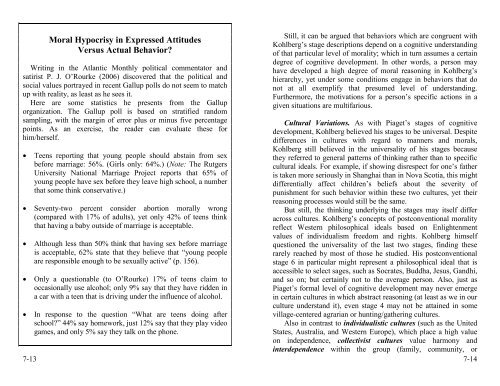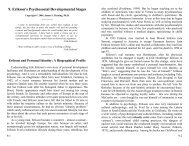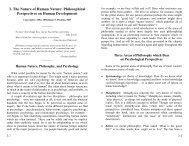7. Piaget, Kohlberg, Gilligan, and Others on Moral Development
7. Piaget, Kohlberg, Gilligan, and Others on Moral Development
7. Piaget, Kohlberg, Gilligan, and Others on Moral Development
You also want an ePaper? Increase the reach of your titles
YUMPU automatically turns print PDFs into web optimized ePapers that Google loves.
7-13<br />
<strong>Moral</strong> Hypocrisy in Expressed Attitudes<br />
Versus Actual Behavior?<br />
Writing in the Atlantic M<strong>on</strong>thly political commentator <str<strong>on</strong>g>and</str<strong>on</strong>g><br />
satirist P. J. O’Rourke (2006) discovered that the political <str<strong>on</strong>g>and</str<strong>on</strong>g><br />
social values portrayed in recent Gallup polls do not seem to match<br />
up with reality, as least as he sees it.<br />
Here are some statistics he presents from the Gallup<br />
organizati<strong>on</strong>. The Gallup poll is based <strong>on</strong> stratified r<str<strong>on</strong>g>and</str<strong>on</strong>g>om<br />
sampling, with the margin of error plus or minus five percentage<br />
points. As an exercise, the reader can evaluate these for<br />
him/herself.<br />
• Teens reporting that young people should abstain from sex<br />
before marriage: 56%. (Girls <strong>on</strong>ly: 64%.) (Note: The Rutgers<br />
University Nati<strong>on</strong>al Marriage Project reports that 65% of<br />
young people have sex before they leave high school, a number<br />
that some think c<strong>on</strong>servative.)<br />
• Seventy-two percent c<strong>on</strong>sider aborti<strong>on</strong> morally wr<strong>on</strong>g<br />
(compared with 17% of adults), yet <strong>on</strong>ly 42% of teens think<br />
that having a baby outside of marriage is acceptable.<br />
• Although less than 50% think that having sex before marriage<br />
is acceptable, 62% state that they believe that “young people<br />
are resp<strong>on</strong>sible enough to be sexually active” (p. 156).<br />
• Only a questi<strong>on</strong>able (to O’Rourke) 17% of teens claim to<br />
occasi<strong>on</strong>ally use alcohol; <strong>on</strong>ly 9% say that they have ridden in<br />
a car with a teen that is driving under the influence of alcohol.<br />
• In resp<strong>on</strong>se to the questi<strong>on</strong> “What are teens doing after<br />
school?” 44% say homework, just 12% say that they play video<br />
games, <str<strong>on</strong>g>and</str<strong>on</strong>g> <strong>on</strong>ly 5% say they talk <strong>on</strong> the ph<strong>on</strong>e.<br />
Still, it can be argued that behaviors which are c<strong>on</strong>gruent with<br />
<str<strong>on</strong>g>Kohlberg</str<strong>on</strong>g>’s stage descripti<strong>on</strong>s depend <strong>on</strong> a cognitive underst<str<strong>on</strong>g>and</str<strong>on</strong>g>ing<br />
of that particular level of morality; which in turn assumes a certain<br />
degree of cognitive development. In other words, a pers<strong>on</strong> may<br />
have developed a high degree of moral reas<strong>on</strong>ing in <str<strong>on</strong>g>Kohlberg</str<strong>on</strong>g>’s<br />
hierarchy, yet under some c<strong>on</strong>diti<strong>on</strong>s engage in behaviors that do<br />
not at all exemplify that presumed level of underst<str<strong>on</strong>g>and</str<strong>on</strong>g>ing.<br />
Furthermore, the motivati<strong>on</strong>s for a pers<strong>on</strong>’s specific acti<strong>on</strong>s in a<br />
given situati<strong>on</strong>s are multifarious.<br />
Cultural Variati<strong>on</strong>s. As with <str<strong>on</strong>g>Piaget</str<strong>on</strong>g>’s stages of cognitive<br />
development, <str<strong>on</strong>g>Kohlberg</str<strong>on</strong>g> believed his stages to be universal. Despite<br />
differences in cultures with regard to manners <str<strong>on</strong>g>and</str<strong>on</strong>g> morals,<br />
<str<strong>on</strong>g>Kohlberg</str<strong>on</strong>g> still believed in the universality of his stages because<br />
they referred to general patterns of thinking rather than to specific<br />
cultural ideals. For example, if showing disrespect for <strong>on</strong>e’s father<br />
is taken more seriously in Shanghai than in Nova Scotia, this might<br />
differentially affect children’s beliefs about the severity of<br />
punishment for such behavior within these two cultures, yet their<br />
reas<strong>on</strong>ing processes would still be the same.<br />
But still, the thinking underlying the stages may itself differ<br />
across cultures. <str<strong>on</strong>g>Kohlberg</str<strong>on</strong>g>’s c<strong>on</strong>cepts of postc<strong>on</strong>venti<strong>on</strong>al morality<br />
reflect Western philosophical ideals based <strong>on</strong> Enlightenment<br />
values of individualism freedom <str<strong>on</strong>g>and</str<strong>on</strong>g> rights. <str<strong>on</strong>g>Kohlberg</str<strong>on</strong>g> himself<br />
questi<strong>on</strong>ed the universality of the last two stages, finding these<br />
rarely reached by most of those he studied. His postc<strong>on</strong>venti<strong>on</strong>al<br />
stage 6 in particular might represent a philosophical ideal that is<br />
accessible to select sages, such as Socrates, Buddha, Jesus, G<str<strong>on</strong>g>and</str<strong>on</strong>g>hi,<br />
<str<strong>on</strong>g>and</str<strong>on</strong>g> so <strong>on</strong>; but certainly not to the average pers<strong>on</strong>. Also, just as<br />
<str<strong>on</strong>g>Piaget</str<strong>on</strong>g>’s formal level of cognitive development may never emerge<br />
in certain cultures in which abstract reas<strong>on</strong>ing (at least as we in our<br />
culture underst<str<strong>on</strong>g>and</str<strong>on</strong>g> it), even stage 4 may not be attained in some<br />
village-centered agrarian or hunting/gathering cultures.<br />
Also in c<strong>on</strong>trast to individualistic cultures (such as the United<br />
States, Australia, <str<strong>on</strong>g>and</str<strong>on</strong>g> Western Europe), which place a high value<br />
<strong>on</strong> independence, collectivist cultures value harm<strong>on</strong>y <str<strong>on</strong>g>and</str<strong>on</strong>g><br />
interdependence within the group (family, community, or<br />
7-14




